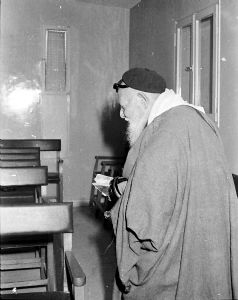A Short Tribute
Hacham Yosef Soso Hacohen was born to Rachima and Hacham Shaul Hacohen on the festival of Shavuot 5651 (1891) in Gabès, Tunisia. His grandfather was Hacham David Hacohen, Head of the Gabès yeshiva and known as a miracle-worker. Hacham Yosef Soso Hacohen studied with Hacham Haim Houri of Gabès, who as to become his principal teacher, and Hacham Fradji Alush, Head of the Beit David yeshiva and Av Beit Din of the Gabès Rabbinic Court.
He married Shashona, daughter of Hacham Zion Cohen, author of Yoshia Zion, in 1910. In 1921, following the decease of Hacham Fradji Alush, he began to serve as head of the yeshiva and Presidentof the Rabbinic Court. In 1941 he moved to Tunis, the capital city, to obtain medical treatments for his son and was appointed Associate to the Chief Rabbi of Tunisia, Hacham Mordecai Kamos Amaiass, and to the Chief Rabbinic Court as Rosh Herkev (head of a triumvirate of rabbinic judges).
At the age of seventy, in 1958, Hacham Soso Hacohen immigrated to Israel, settling in Beer Sheva's Shikkun Dalet neighborhood. He moved to Jerusalem after being appointed to the Sephardi Eidah HaHaredit Rabbinic Court and set the Porat Yosef and Reishit Hochma yeshivot as the places for his daily study.
Hacham Yosef Soso Hacohen passed away on 12 Iyar 5740 (1980) and was buried in the rabbis' section of the Beer Sheva cemetery. His grandson, Rabbi Yoram Cohen, Rabbi of the Ramot neighborhood in Beer Sheva, established the Imrei Yosef institutions in his commemoration: a network of preschools in Beer Sheva, a pensioners' kollel, and a kollel for rabbinic studies. Hacham Yosef Soso Hacohen authored many books, including Haim BaYad – Responsa, Keshot HaNesech – on Talmudic topics, Kisa D'Pascha – on the Passover Haggadah, Pirchei Shoshanna – Responsa, sayings by CHaZa"L and original commentary on the Bible, and Yiftach Yosef – containing original commentary on the Torah and religious laws.
